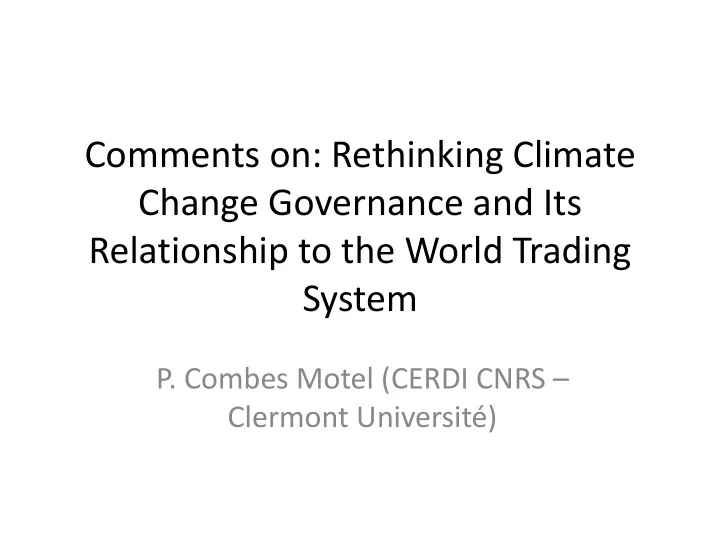

Comments on: Rethinking Climate Change Governance and Its Relationship to the World Trading System P. Combes Motel (CERDI CNRS – Clermont Université)
Main thesis of the paper • Trade restrictions deserve attention in the design of a post-Kyoto climate agreement 2
Why trade restrictions? • limit leakages: taxes neither neutralise leakages or induce leakage, carbon trading schemes hardly have an effect (IEA papers) • limit free-riding opportunities: trade restrictions can induce emissions limitations by non-cooperating countries 3
How to implement trade restrictions? • The KP compliance mechanism is not credible • We should learn from the Montreal Protocol • Several tools: credible trade bans, technology standards, border taxes, etc. • Need for a new international regime: Somewhere between revised top-down and bottom-up approaches 4
The issue of carbon leakages • Controversial literature • Discussion about the theoretical background that criticises the KP. Leakages from unilateral emissions reductions may be overstated: – Copeland and Taylor (2005), Bednar-Friedl et al. (2010) , di Maria & van der Werf (2007), etc. • Other concern: carbon leakage estimates are diverse and questionable 5
The Montreal Protocol – 1 “Comparison is not reason” O3 depleting substances Greenhouse gases Media coverage of O3 depletion causes Scepticism on climate change (e.g. and consequences in the 80s had a Lomborg) and its anthropic causes in powerful effect on public opinions developed and developing countries Abatement costs are diverse (e.g. Mac Cheap substitution possibilities, have Kinsey) ; industrial sector more reluctant gained support from the industrial sector to abate 6
The Montreal Protocol – 2 Is it fully successful? • Availability of data on CFCs and other O3 depleting substances: are provided by states which depend heavily on industrial declarations • Black Markets CFCs (WRI, UNEP) • Substitution effect between O3 depleting substances and GHGs • More generally global warming and O3 depletion are dependent 7
The issue of sectorial environmental agreements • You seem to suggest sectorial initiatives: aviation, iron and steel, automobile, electricity generation • What about the administration cost of a system with many international agreements and several international agencies? • And what about the spillovers between sectors? • Do you support the French initiative for a World Environmental Organisation? Should we reform the UNEP? 8
R&D and new standards • Who will pay for R&D? How to give incentives to R&D? • Internal combustion engine ban: is it really palatable? • And what about the nuclear electricity generation? (precautionary principle) 9
Miscellaneous questions • Disillusion from top-down approaches to IEAs in Cancun: what do you think of China commitment to 40-45% carbon intensity reduction target by 2020 ? • Are results from Cancun of importance? • Energy subsidies (OECD 2009) • Trade restrictions on environmental goods 10
Recommend
More recommend